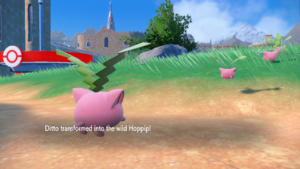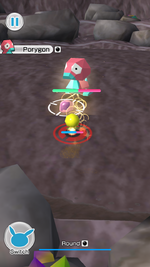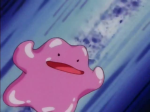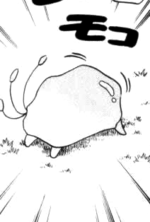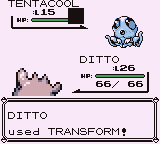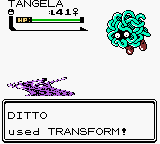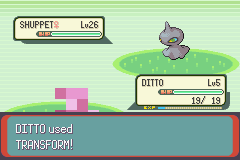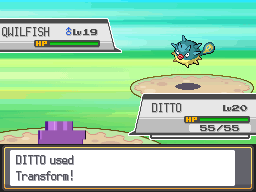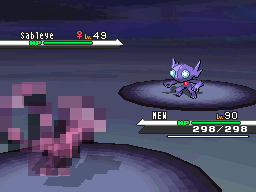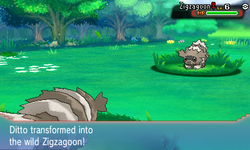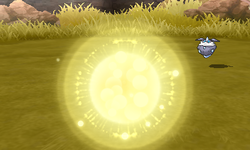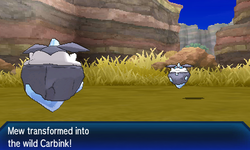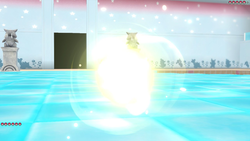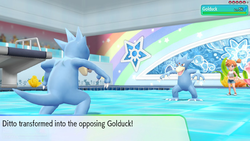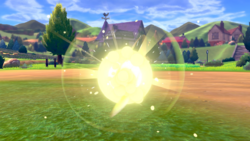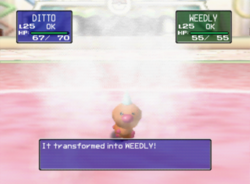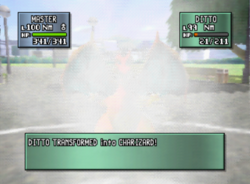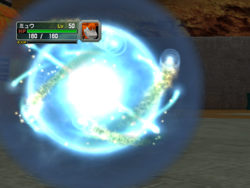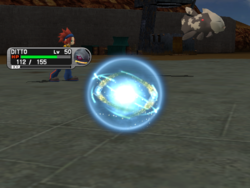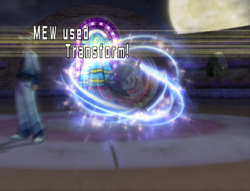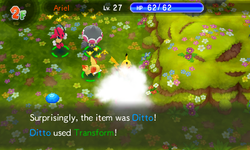Transform (move)
| Transform へんしん Transform | ||||||||||||
| ||||||||||||
Range
| ||||||||||||
Availability
| ||||||||||||
| ||||||||||||
| ||||||||||||
| ||||||||||||
Transform (Japanese: へんしん Transform) is a non-damaging Normal-type move introduced in Generation I.
The Ability Imposter has the same effect as Transform.
Effect
Transform causes the user to become a copy of the target.
Transform bypasses accuracy checks to always hit, unless the target is in the semi-invulnerable turn of a move such as Dig or Fly. It is not affected by type immunity. Transform fails if used on a Pokémon that is protected by Crafty Shield, but works on a target protected by other moves such as Protect or Detect. It also fails if it or the target are transformed or disguised by an Illusion or if the target is behind a substitute. Some of these conditions were different in older generations; see the table below for details on when conditions would not prevent Transform from executing.
| Gen I | Gen II | Gen III | Gen IV | Gen V | Gen VI | Gen VII | Gen VIII | Gen IX | ||
|---|---|---|---|---|---|---|---|---|---|---|
| Can execute? | Target is semi-invulnerable | ✔ | ✘ | ✘ | ✘ | ✘ | ✘ | ✘ | ✘ | ✘ |
| Target is transformed | ✔ | ✘ | ✘ | ✘ | ✘ | ✘ | ✘ | ✘ | ✘ | |
| User is transformed | ✔ | ✔ | ✔ | ✔ | ✘ | ✘ | ✘ | ✘ | ✘ | |
| Target is behind a substitute | ✔ | ✔ | ✔ | ✔ | ✘ | ✘ | ✘ | ✘ | ✘ | |
A transformation cannot be transferred via Baton Pass.
A transformed Pokémon returns to its original state once it is switched out, faints, or the battle ends.
Copied traits
Broadly, Transform copies the target's appearance, types, Ability, stats, and moves; the user retains its HP and level. More precise details are below.
| Gen I | Gen II | Gen III | Gen IV | Gen V | Gen VI | Gen VII | Gen VIII | Gen IX | |
|---|---|---|---|---|---|---|---|---|---|
| Name | ✘ | ✘ | ✘ | ✘ | ✘ | ✘ | ✘ | ✘ | ✘ |
| Level | ✘ | ✘ | ✘ | ✘ | ✘ | ✘ | ✘ | ✘ | ✘ |
| HP (current and maximum) | ✘ | ✘ | ✘ | ✘ | ✘ | ✘ | ✘ | ✘ | ✘ |
| Status condition | ✘ | ✘ | ✘ | ✘ | ✘ | ✘ | ✘ | ✘ | ✘ |
| Friendship | ✘ | ✘ | ✘ | ✘ | ✘ | ✘ | ✘ | ✘ | |
| Held item | ✘ | ✘ | ✘ | ✘ | ✘ | ✘ | ✘ | ✘ | |
| Species | ✔ | ✔ | ✔ | ✔ | ✔ | ✔ | ✔ | ✔ | ✔ |
| Appearance | ✔ | ✔ | ✔ | ✔ | ✔ | ✔ | ✔ | ✔ | ✔ |
| Types | ✔ | ✔ | ✔ | ✔ | ✔ | ✔ | ✔ | ✔ | ✔ |
| Attack, Defense, Special Attack, Special Defense, Speed | ✔ | ✔ | ✔ | ✔ | ✔ | ✔ | ✔ | ✔ | ✔ |
| Stat stages | ✔ | ✔ | ✔ | ✔ | ✔ | ✔ | ✔ | ✔ | ✔ |
| Moves | ✔ | ✔ | ✔ | ✔ | ✔ | ✔ | ✔ | ✔ | ✔ |
| Height and weight | ✔ | ✔ | ✔ | ✔ | ✔ | ✔ | ✔ | ✔ | ✔ |
| Catch rate | ✘ | ✘ | ✔ | ✔ | ✘ | ✘ | ✘ | ✘ | ✘ |
| EV yield and base Exp. | ✘ | ✘ | ✔ | ✔ | ✔ | ✔ | ✔ | ✔ | ✔ |
| Ability | ✔ | ✔ | ✔ | ✔ | ✔ | ✔ | ✔ | ||
| Cry | ✘ | ✘ | ✘ | ✔ | ✔ | ✔ | ✔ | ✔ | ✔ |
| Gender | ✘* | ✘ | ✘ | ✔ | ✔ | ✔ | ✔ | ✔ |
*: In Generation II, the Love Ball uses copied IVs for transformed wild Pokémon. See below
Transform copies any changes to the target's type (such as from Conversion or Color Change), Ability (such as from Skill Swap), or moves (via Mimic). It also copies types added by Forest's Curse or Trick-or-Treat. If the target has no primary types (not counting added types, that is) due to Roost, Burn Up, or Double Shock, the transformation's primary type will be Normal.
The user's level has no effect, except in Generations I-III if the Pokémon levels up and its stats are recalculated. Appearance refers to the sprite or model of the Pokémon shown on the field and covers the Pokémon's species, gender, form, and whether it is Shiny. (Prior to Generation IV, there was some complicated nuance regarding the transformation's coloration.) The copied stats (Attack, Defense, Special Attack, Special Defense, Speed) include the final values (as seen on the summary screen) as well as the target's base stats, individual values, and effort values. Outside of the transformation's appearance, gender (for the purpose of battle mechanics as well as the gender symbol after the name) was only copied starting in Generation V, with a small exception in Generation II.
Transform does not affect the user's Hidden Power (whose type, as well as the power up to Generation V, are based on the user's original IVs). It also will not alter status conditions or volatile statuses (such as Telekinesis or Leech Seed) based on the transformation's immunities.
Appearance nuances
In all generations, in the summary and party screens, a transformed Pokémon is shown in its untransformed state. (This applies to its moves, Ability, and stats as well.) In Nintendo DS and 3DS games, the list of moves seen on the bottom screen during battle will also show the untransformed sprite of the Pokémon.
In Generation I, if either the user or the target's sprite has changed because of Acid Armor or Minimize, after using Transform, the transformation's normal sprite will be shown.
In the Generation I and II core series games, a transformed Pokémon retains its original color palette.
In Pokémon Stadium 2 and Generation III games (including Pokémon Colosseum and XD), whether a transformed Pokémon appears Shiny depends on whether the user was originally Shiny; since Generation IV, it depends on whether the target was Shiny.
In Pokémon: Let's Go, Pikachu! and Let's Go, Eevee!, if the Partner PikachuP/EeveeE is the target of Transform, Transform will copy any clothes they are wearing.
Forms

|
This move effect may be in need of research. Reason: Gen III: Interaction with Deoxys's forms in link battles between games in which Deoxys has different forms You can discuss this on the talk page. |
|---|
Transform copies the target's current form. In Generations III and IV, a transformed Pokémon can change form if it fulfills the conditions for a form change (such as by holding a Plate as Arceus). Since Generation V, a transformed Pokémon cannot change forms.
Dynamax transformations are not treated like a form, meaning Transform will copy the base form of a Dynamax or Gigantamax Pokémon or Eternamax Eternatus, and a transformed Pokémon is able to Dynamax. If Transform copies a Gigantamax Pokémon, it does not copy the Gigantamax Factor, so Dynamaxing will not result in a Gigantamax Pokémon. If Transform is used by a Dynamaxed Pokémon, it will fail if the target is Zacian, Zamazenta, or Eternatus.
Transform will fail if the target is a Starmobile. If the target is a Titan Pokémon, the user transforms into a regular version of that species.
PP

|
This move effect may be in need of research. Reason: Are PP Ups taken into account for maximum PP displayed for a transformed Pokémon in Generation I and II? You can discuss this on the talk page. |
|---|
When a move is copied, it will have 5 PP, unless its maximum PP is less (such as Sketch). In Generations I and II, the maximum PP is the same as the move's natural maximum PP; in Generations III and IV, each copied move receives the effect of PP Ups applied to the same move slot of the user's original moves; since Generation V, the maximum PP for copied moves is 5.
In Generations I-III, PP-restoring items such as Ether can only restore PP to a move if the Pokémon knew the move before transforming. For a held Leppa Berry, if a move the Pokémon did not know reaches 0 PP, the Berry will not trigger.
Species-exclusive conditions

|
This move effect may be in need of research. Reason: For Gen VI: Interaction with choice items on targets who also know Transform aside from Generation V You can discuss this on the talk page. |
|---|
A transformed Pokémon retains its original species for determining if it is boosted by most Pokémon-specific stat-enhancing items. Only Metal Powder and Quick Powder use the transformation's species.
A transformed Pokémon can use moves exclusive to a species it has transformed into, such as Hyperspace Fury if transformed into Hoopa Unbound or exclusive Z-Moves (if it holds the correct Z-Crystal, and is not Mega-Evolved).
If a Pokémon transforms into Meteor Form Minior, Shields Down will not prevent it from being afflicted with status conditions.
Generation I
In this generation only, if the player's Pokémon is transformed and deals or receives a critical hit, its untransformed stats are used in the damage calculation. (The calculation correctly uses transformed stats for wild and NPC Pokémon.)
In Pokémon Stadium only, Transform fails if the target's current species is Ditto.
Glitches
- Main article: Transform glitches
Generation I has several glitches relating to Transform. Any transformed wild Pokémon will become Ditto if it is caught, due to the Transform assumption glitch. If a transformed Pokémon uses Transform again, its previous stats (stored as a backup) are overwritten by its current stats (as they are backed up so that Transform can change the working stats); this is the Transform DV manipulation glitch. If a Pokémon that is not Ditto uses Transform, the color loss glitch will cause it to change to Ditto's palette. The level up moveset glitch causes a transformed Pokémon to regain its original moveset if it levels up and learns a new move.
Generation II
In this generation only, for a wild transformed Pokémon, the Love Ball uses the stats copied by Transform and the Pokémon's original species to determine the Pokémon's gender[1]. Both Attract and the gender symbol shown in battle obey the Pokémon's original gender (for any transformed Pokémon).
In this generation only, Mirror Move always fails when used by a transformed Pokémon.
Glitches
- Main article: Transform glitches
Generation II has several glitches relating to Transform. The Transform assumption glitch and Transform DV manipulation glitch from Generation I still exist. The latter now has an additional effect, the Roar/Whirlwind shared DV glitch: in a battle with an NPC, if the NPC's Pokémon has used Transform twice and is forced to switch out, the next Pokémon will have its predecessor's DVs. If a transformed Pokémon is caught, it will have 10/10 PP for Transform despite having used the move.
Generation III
During a Pokémon Contest, the Pokémon will transform into one of the other contestants.
Generation IV
During a Pokémon Super Contest, the Pokémon will transform into one of the other contestants.
Generation V
Pokémon that know Transform are banned from participating in Pokéstar Studios films.
Generation VI
In a Pokémon Contest Spectacular, when Transform is used, a Substitute doll is thrown on the stage and the user transforms into the doll. The effect of Transform will last for the round it is used in.
Generation VII
If a Pokémon transforms into a Mega Evolved Pokémon, it cannot use any Z-Moves, even if it holds an appropriate Z-Crystal.
If powered up by a Normalium Z into Z-Transform, the user's HP is fully restored.
Generation IX
Transform does not copy Tera Types, meaning that a transformed Pokémon that has Terastallized will use its own Tera Type.
Description
|
Learnset
By leveling up
| # | Pokémon | Types | Egg Groups | Level | ||||||||||
|---|---|---|---|---|---|---|---|---|---|---|---|---|---|---|
| I | II | III | IV | V | VI | VII | VIII | IX | ||||||
| 0132 | 
|
Ditto | 1 | 1 | 1 | 1 | 1 | 1 | 1 | 1 | 1 | |||
| 0151 | 
|
No Eggs Discovered | 10 | 10 | 10 | 1 | 1 | 1 | 1SMUSUM 99PE |
80 | 80 | |||
| Bold indicates a Pokémon gains STAB from this move. Italics indicates a Pokémon whose evolution or alternate form receives STAB from this move. A dash (−) indicates a Pokémon cannot learn the move by the designated method. An empty cell indicates a Pokémon that is unavailable in that game/generation. | ||||||||||||||
In other games
Pokémon Mystery Dungeon series
In Red Rescue Team and Blue Rescue Team and Explorers of Time, Darkness and Sky, Transform has 1PP. The move causes the user to take the form of a random hostile Pokémon on the dungeon's floor. It does not copy anything else; if the Pokémon had nothing but Transform, they are left only with the regular attack and Struggle. This move is affected by Taunt.
In Pokémon Super Mystery Dungeon, Transform copies the appearance, type, Ability, moves, and stat modifications of the target for the current floor. Moves learned through Sketch while transformed will be forgotten after moving to the next floor. If used by an enemy to transform into the leader, the leader's teammates become confused.
Transformed Pokémon are still prone to status conditions and Dungeon tile restrictions from its original form; for example, a Ditto transformed into a Fire-type can still be burned, and a Pokémon that cannot walk through water still cannot when transforming into a Pokémon that is able to.
Pokémon GO
In a Gym or Raid Battle, Transform is automatically cast at the beginning of the battle. It turns the user into a copy of the opponent and copies the opponent's moves, species, base Attack, and base Defense; HP, IVs, and Power Up level are not copied. Unlike other attacks, Transform does not require the user to wait out the duration before casting an attack or dodging, and its animation is purely visual. However, it may cause lag for the rest of the battle if the player attempts to attack during the animation. The effects of Transform expire at the end of the battle.
Transform will not be cast if the opponent is a Ditto.
If Ditto is used against a Team GO Rocket Grunt or another player, Transform will do absolutely nothing, including charging an attack.
| Fast Attack | |||||||||||
|
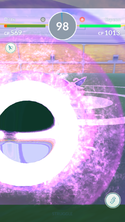
| ||||||||||
| |||||||||||
| Eligible Pokémon: | |||||||||||
|
|||||||||||
Updates
- Gyms & Raids
- February 16, 2017
- Duration: 1.73 → 2.23 seconds
Pokémon Rumble Rush
In Pokémon Rumble Rush, all status moves including Transform could only be used by opposing Pokémon and could not be obtained on any caught Pokémon. Transform could be seen as a move used by opposing Ditto.
Description
|
In the anime
| The user transforms into a copy of the foe right down to having the same move set. | |||
| Pokémon | Method | ||
|---|---|---|---|
| User | First Used In | Notes | |

|
Ditto's body glows white, multicolored, yellow, or light blue, then transforms into the opponent. | ||
| Duplica's Ditto | Ditto's Mysterious Mansion | Debut | |
| Drake's Ditto | Hello, Pummelo! | None | |
| Duplica's Mini-Dit | Imitation Confrontation | None | |
| Brodie's Ditto | Unfair Weather Friends | None | |
| A wild Ditto | Pikachu's Ghost Carnival | None | |
| Narissa's Ditto 1 | Dealing With a Fierce Double Ditto Drama! | None | |
| Narissa's Ditto 2 | Dealing With a Fierce Double Ditto Drama! | None | |
| A wild Ditto | Deceiving Appearances! | None | |
| A Ditto hired by Kublock | A Talent for Imitation! | None | |

|
Mew's body glows white or multicolored, then it transforms into any Pokémon. It is possible for Mew to transform into multiple Pokémon at once. | ||
| A wild Mew | The Journey to be a Pokémon Master Begins!! | None | |
| Mew (M08) | Lucario and the Mystery of Mew | None | |
| Mew (anime) | Enter Pikachu! | None | |
In the manga
Aim to Be a Card Master!!
| The user transforms into the opposing Pokémon. | |||
| Pokémon | Method | ||
|---|---|---|---|
| User | First Chapter Used In | Notes | |

|
Ditto transforms into the opposing Pokémon. | ||
| Kenta's Ditto | District Convention "Kenta, to the Open Sea" | Debut | |
The Electric Tale of Pikachu
| The user morphs its body to look like the target. | |||
| Pokémon | Method | ||
|---|---|---|---|
| User | First Chapter Used In | Notes | |

|
Ditto morphs its body into a flimsy, giggly copy of the opponent. | ||
| Duplica's Ditto | Pikachu's Excellent Adventure | Debut | |
| Drake's Ditto | The Orange Crew Supreme Gym Leader | None | |
Pokémon Adventures
| The user transforms into a copy of the foe right down to having the same move set. | |||
| Pokémon | Method | ||
|---|---|---|---|
| User | First Chapter Used In | Notes | |

|
Ditto morphs its body into the shape of something. It also gains the opponent's abilities as well. | ||
| Green's Ditty | Tauros the Tyrant | Debut | |
| A Team Rocket Grunt's Ditto | Miltank Melee | None | |
Pokémon Gold & Silver: The Golden Boys
| The user transforms into a replica of something else. | |||
| Pokémon | Method | ||
|---|---|---|---|
| User | First Chapter Used In | Notes | |

|
Ditto turns into an exact replica of something else. | ||
| Whitney's Ditto | For Pikachu's Sake!! The Search For The Missing Farfetch'd | Debut | |
Pokémon Gotta Catch 'Em All
| The user transforms into a copy of something else. | |||
| Pokémon | Method | ||
|---|---|---|---|
| User | First Chapter Used In | Notes | |

|
Ditto turns into a copy of something else. | ||
| Shu's Ditto | Get Moltres? | Debut | |
Pokémon Pocket Monsters
| The user transforms into a replica of the foe. | |||
| Pokémon | Method | ||
|---|---|---|---|
| User | First Chapter Used In | Notes | |

|
Clefairy transforms into an animate object. | ||
| Red's Clefairy | Bring Down the Powerful Opponent Onix!! | Debut Clefairy cannot legally learn Transform | |

|
Ditto turns into an exact replica of the opponent. | ||
| Giovanni's Ditto | Who's The Real Clefairy?! | None | |
Pokémon Zensho
| The user transforms into the opposing Pokémon. | |||
| Pokémon | Method | ||
|---|---|---|---|
| User | First Chapter Used In | Notes | |

|
Ditto transforms into the opposing Pokémon. | ||
| Satoshi's Ditto | Fuchsia City | Debut | |
In other generations
Core series games
Side series games
Spin-off series games
Trivia
- In Generation I core series games and Japanese Pokémon Stadium, if two Pokémon battle using only Transform (such as a battle between two Ditto or two Mew with Transform), both Pokémon are able to continually Transform into each other, replenishing the 5 PP constantly and so that the battle never has to end.
- Since the Transform user retains its own gender, it is possible to transform into a Pokémon species which would be normally unavailable with that gender. For instance, a male Smeargle retains his gender (including the symbol ♂ displayed in battle), even when transformed into female-only Pokémon such as Miltank, Chansey, or Tsareena, or into gender-unknown Pokémon such as Mewtwo, Beldum, or Cryogonal.
- The Transform user copies the appearance and visual gender differences of the target, even if those are not compatible with the Transform user's gender. For instance, if a male Smeargle copies a female Pikachu, then he will have the appearance of a female Pikachu as well (with the heart-shaped tail) even though he remains male like before (with the ♂ symbol in battle).
- Transform is the only way to see the battle animation of Cherrim's Sunshine Form in Generation IV, as Cherrim sent from a Poké Ball will always be sent out in Overcast Form, and Cherrim is not available in the wild in Generation IV. A Ditto that transforms into Cherrim, however, will play the animation of the alternate form if it escapes from a thrown Poké Ball.
- In Generations I and II, since most Pokémon can use Transform via Mimic and keep their original color palette while transformed, it is possible to see several color palettes applied to any Pokémon. For example, if a Pikachu, Bulbasaur, or Charmeleon uses Transform (via Mimic), it becomes a yellow, green, or red version of the target, respectively.
- In these generations, the Pokémon images and their color palettes are stored separately in the game data, so the palettes are able to be arbitrarily applied to each Pokémon. There is no need to store repeated Pokémon images with different colors in the internal data.
- From Generation III to V, a transformed Pokémon may legitimately have up to 765 EVs (if it has 255 HP EVs, and the target Pokémon has 510 EVs other than HP). Similarly, from Generation VI onwards, a transformed Pokémon may legitimately have up to 762 EVs (if it has 252 HP EVs, and the target Pokémon has 510 EVs other than HP).
- In the German version of the Generation II games, this move was renamed from Wandler into Verwandler. The reason for this is unknown. Even though the difference in meaning is minimal, this change was retracted in the following generations.
In other languages
| |||||||||||||||||||||||||||||||||||||||||||||||||||||||||||||||||||
References

|
This article is part of Project Moves and Abilities, a Bulbapedia project that aims to write comprehensive articles on two related aspects of the Pokémon games. |
- Moves
- Moves that can target any adjacent Pokémon
- Normal-type moves
- Smart moves
- Status moves
- Generation I moves
- Moves in need of research
- Fast Attacks in Pokémon GO
- Moves in Pokémon Rumble Rush
- Moves that cannot miss
- Moves that change a Pokémon's type
- Ability-changing moves
- Moves in Pokémon: Let's Go, Pikachu! and Let's Go, Eevee!
- Moves usable in Pokémon Sword and Shield
- Moves in Pokémon Mystery Dungeon: Rescue Team DX

